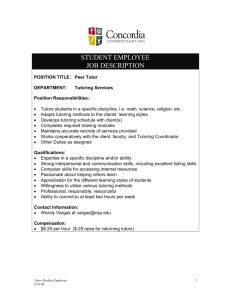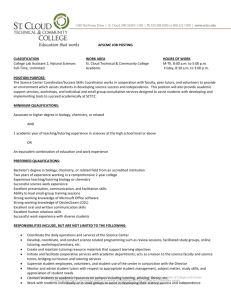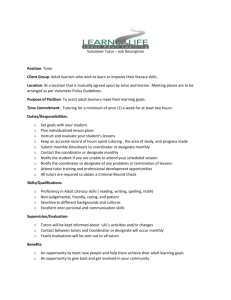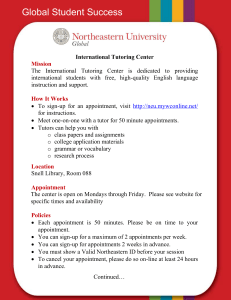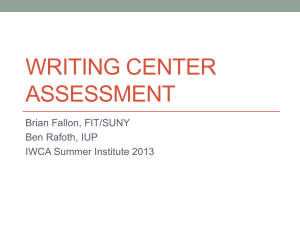Private Employment in the Tutoring Industry, Advice to Staff
advertisement
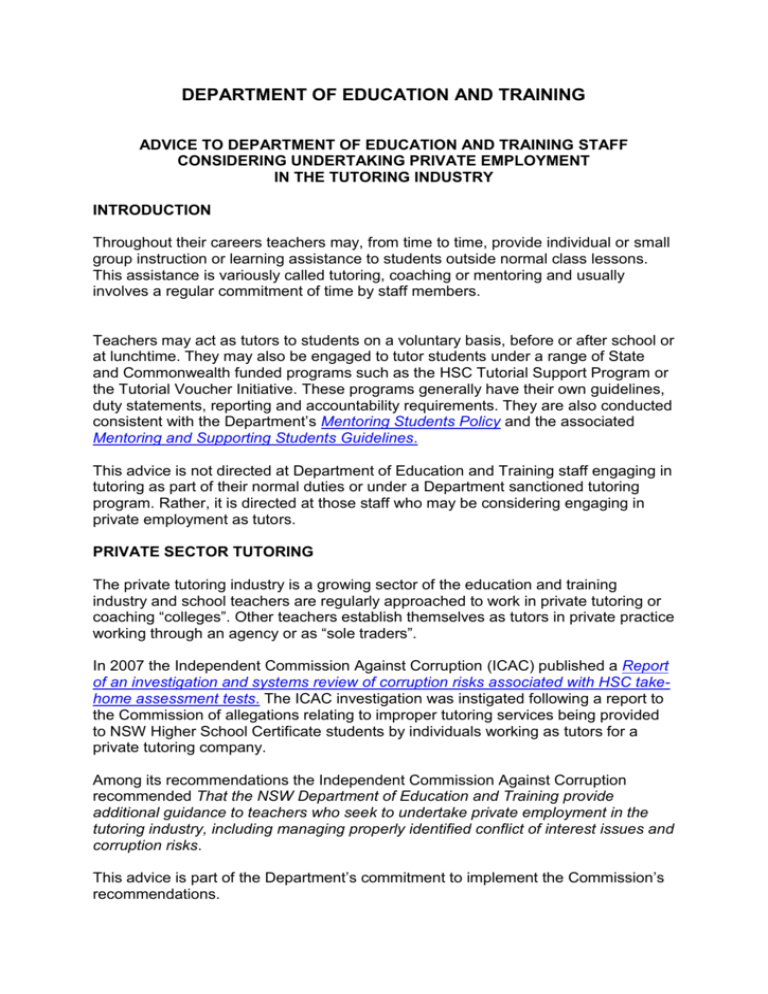
DEPARTMENT OF EDUCATION AND TRAINING ADVICE TO DEPARTMENT OF EDUCATION AND TRAINING STAFF CONSIDERING UNDERTAKING PRIVATE EMPLOYMENT IN THE TUTORING INDUSTRY INTRODUCTION Throughout their careers teachers may, from time to time, provide individual or small group instruction or learning assistance to students outside normal class lessons. This assistance is variously called tutoring, coaching or mentoring and usually involves a regular commitment of time by staff members. Teachers may act as tutors to students on a voluntary basis, before or after school or at lunchtime. They may also be engaged to tutor students under a range of State and Commonwealth funded programs such as the HSC Tutorial Support Program or the Tutorial Voucher Initiative. These programs generally have their own guidelines, duty statements, reporting and accountability requirements. They are also conducted consistent with the Department’s Mentoring Students Policy and the associated Mentoring and Supporting Students Guidelines. This advice is not directed at Department of Education and Training staff engaging in tutoring as part of their normal duties or under a Department sanctioned tutoring program. Rather, it is directed at those staff who may be considering engaging in private employment as tutors. PRIVATE SECTOR TUTORING The private tutoring industry is a growing sector of the education and training industry and school teachers are regularly approached to work in private tutoring or coaching “colleges”. Other teachers establish themselves as tutors in private practice working through an agency or as “sole traders”. In 2007 the Independent Commission Against Corruption (ICAC) published a Report of an investigation and systems review of corruption risks associated with HSC takehome assessment tests. The ICAC investigation was instigated following a report to the Commission of allegations relating to improper tutoring services being provided to NSW Higher School Certificate students by individuals working as tutors for a private tutoring company. Among its recommendations the Independent Commission Against Corruption recommended That the NSW Department of Education and Training provide additional guidance to teachers who seek to undertake private employment in the tutoring industry, including managing properly identified conflict of interest issues and corruption risks. This advice is part of the Department’s commitment to implement the Commission’s recommendations. POLICY RELATING TO DET STAFF WORKING AS PRIVATE TUTORS Staff members considering working as private tutors should be aware that there is legislation and policy relevant to that decision. In the first instance they should recognise that working as a private tutor, even for a few hours per week, constitutes private employment. If the staff member is a teacher, the Teaching Service Act 1980 applies. At Section 92 B that Act says 92B Officers and temporary employees (are) not to undertake other paid work without permission (1) An officer or temporary employee is not to undertake any other paid work without the permission of the Director-General. (2) The Director-General may prepare guidelines with respect to the type of work that constitutes paid work for the purposes of this section. (3) Any such guidelines must be made available to officers and temporary employees in such manner as the Director-General thinks appropriate. (4) This section does not apply to a temporary employee employed on a casual basis. Staff members who are employed under other legislation (e.g. Education (School Administrative and Support Staff) Act 1987 and the Public Sector Employment and Management Act 2002) have similar provisions. The guidelines referred to above are the Private and Secondary Employment Policy, Private and Secondary Employment Guidelines which are available on the Department’s policy website. The Policy says, among other things, Private or secondary employment must be lawful and not damage the reputation of the Department. In considering applications for private or secondary employment, the protection of children is to be the paramount consideration. In general, employees may not work in competition with any section of the Department. In certain cases, permission to do so may be obtained. Approval may be granted if it is in the interest of, or of benefit to the Department. Issues of conflict of interest must be fully addressed by the applicant. A key implication of the policy and guidelines in this context is that department employees who wish to undertake paid work as a tutor (other than those in department sponsored and operated programs and activities) are required to seek prior approval using the application form attached to the guidelines. Staff members are also given relevant direction on this issue in the Department’s Code of Conduct Policy and the associated Code of Conduct Procedures. In particular staff considering working as private tutors should read the sections on Conflict of Interest and Private and Secondary Employment. Teachers and tutors of Higher School Certificate students should also be aware of the policies, rules and procedures issued by the NSW Board of Studies with regard to HSC Assessment. A good starting place is the Board of Studies statement on Honesty in HSC Assessment - the Standard published on the Board’s website. This statement is part of the Board’s HSC: ALL MY OWN WORK initiative on the principles and practice of good scholarship. IDENTIFIED CONFLICTS OF INTEREST Work undertaken by the Office of Schools in collaboration with Audit and Risk Management Directorate and with the assistance of a group of Secondary Principals and Head Teachers, has identified the following examples of potential “conflict of interest situations” for Department staff: Teachers preparing candidates for the HSC making themselves available to coach or tutor the same students for money outside of school hours Teachers preparing candidates for the HSC referring those students to a colleague teacher with whom they are associated for paid tutoring Teachers advising students or their parents that the student would benefit from individual tutoring and recommending a particular individual or company with which they have an association Teachers working in selective high schools offering to prepare students for selective high school placement tests for money either privately or through “coaching colleges” Teachers in schools with Opportunity Classes preparing students for the Opportunity Class Placement Test as private tutors Teachers using their approved secondary employment as HSC markers to promote their private business interests as paid tutors IDENTIFIED CORRUPTION RISKS The working group also identified the following corruption risks for the Department or for Department staff working as private tutors: Teacher tutors being unaware of requirements of private employment policy fail to seek approval for employment as tutors leading to inability to manage potential malpractice and inability to target advice on ethical practice. Schools failing to establish and maintain records of staff working privately as tutors leading to an inability to identify staff at risk of malpractice or at risk of being offered inducements to behave unethically. Schools being unaware of the number of students receiving tutoring with no consistent approach to the identification and recording of students receiving tutoring leading to malpractice not being detected. Teachers, particularly new teachers, not understanding the relevance or impact of policy and guidelines leading to malpractice not being identified and increased potential for corrupt behaviour. Tutors failing to observe ethical standards of professional behaviour by “crossing the line” between providing appropriate support and assistance to students preparing assessment tasks and producing material which the student subsequently asserts is “all their own work”. Lack of knowledge of some tutors/tutoring organizations of the mandatory BoS/DET requirements leading to increased potential of rules/guidelines not being followed. Tutoring not happening in established businesses such as “tutoring colleges” but through informal “off record” practices leading to greater difficulty in detecting potential malpractice. Tutors failing to make clear to individuals contracting their services the ethical code of practice which applies in the tutor/student relationship leading to unreasonable expectations on behalf of students and their parents of the extent to which tutors will assist students in the preparation of assessment tasks. Emerging technologies which facilitate plagiarism not being identified leading to malpractice not being detected. MANAGING CONFLICTS OF INTEREST Potential conflicts of interest are part of the working environment for many public sector officials, including school teachers. The issue is not that potential conflicts of interest arise but rather what individuals do subsequently to manage the conflict. The Code of Conduct indicates that staff members are required to avoid conflicts of interest if possible, and avoid creating conflicts for others. They are also required to disclose in writing to their supervisor any perceived or actual conflict of interest as soon as they become aware that there is, or may be, a potential conflict. The Code of Conduct Procedures at Section 25.1 indicates that conflicts of interest can be resolved or managed through a range of actions such as: the supervisor recording the details of the conflict and taking no further action in relation to the conflict because the potential for conflict is minimal or can be eliminated by disclosure or effective supervision; the supervisor of the staff member with the conflict checking and endorsing, if appropriate, the actions taken with respect to the matter creating the conflict; the supervisor referring the decision to a senior staff member who is expert in the issue and independent of the situation; and, in some circumstances, the staff member relinquishing the personal interest by not taking up the position Fundamental to managing a potential conflict of interest is honesty and transparency. Staff members considering working as privately employed tutors should recognise the potential for a conflict of interest, particularly when the student(s) involved have a relationship with them in their public employment. Staff already working as private tutors should examine the potential for a conflict of interest in their current work arrangements and, if appropriate, discuss them with their Department supervisor. CORRUPTION RISK MANAGEMENT The risks of corrupt conduct, malpractice and unethical behaviour are real in circumstances where teachers and other DET staff, highly regarded as education practitioners and subject specialists in their professional lives and “day jobs” are engaged by parents and others to provide individual coaching, tuition or instruction to particular students, usually their children. While many parents engage tutors for remedial assistance, others believe that in the highly competitive environment of public examinations and testing, either for tertiary entrance or selection for specialist educational settings, a private tutor is part of a strategy for “getting an edge” over competition. In such circumstances they are willing to pay, but they expect “results”. They may also take the view that, having agreed to provide tuition for money, the tutor should “do whatever it takes” to achieve the goal. Society generally, and the Department of Education and Training in particular as their employer, expects that DET staff will act professionally and ethically, both in their primary employment and while engaged in any secondary or private employment. Section 21 of the Department’s Code of Conduct Procedures says that staff need to recognise the professional and ethical dimensions of their work and give proper attention to the values which should guide their decisions and actions. In this context the statement on Values in NSW Public Schools is relevant as are the questions posed in Section 21.2 of the Code. When applied to staff of a public sector organisation, ethical decision making includes the following characteristics which the community has a right to expect of its public servants: Impartiality - Making decisions or acting in a way that does not improperly favour one person or interest. Integrity - Acting in such a way that others have no doubt about our motives when we are making decisions or providing services. This might involve: avoiding or declaring situations where our personal interests might be seen to have the potential to affect our judgement. not seeking or accepting any financial or other benefit from persons as a reward for performing our duties, particularly where it is in return for providing or arranging a benefit which the person is not entitled to receive. not seeking to gain personal advantage from information gained in the course of our work. Openness - Providing full and accurate information in an understandable and easily accessible form to those who are entitled to receive it. The Department of Education and Training does not ban its staff from working as private tutors. It recognises that such work can provide legitimate benefits for both staff members and their students. The benefits of coaching and tutoring are such that the Department itself arranges for particular students to be tutored. Nevertheless, the conflict of interest risks and risks of malpractice and unethical behaviour for staff working as private tutors are such that the Department is providing this additional advice for its employees considering undertaking private employment in the tutoring industry. AVAILABLE RESOURCES AND ADVICE The Private and Secondary Employment Policy and the associated Private and Secondary Employment Guidelines are available on the Department’s policy website. The contact officer is the Senior Manager, Human Resource Policy on (02) 9561 8274 The Honesty in HSC Assessment – the Standard and associated material can be found on the Board of Studies website at www.boardofstudies.nsw.edu.au For information and advice on managing conflict of interest and fraud and corruption prevention see the Audit and Risk Management Directorate website (Intranet only) The Code of Conduct Policy and the associated Code of Conduct Procedures are available on the Department’s policy website. The contact officer is the Senior Manager, Serious Misconduct Investigation Team, Employee Performance and Conduct Directorate, (02) 9244 5203 School based staff may also wish to discuss this advice with their Principal, who may, in turn, consult their School Education Director. The Director, School and Regional Policy (02) 9561 8514 is also available to assist. Trevor Fletcher DEPUTY DIRECTOR-GENERAL, SCHOOLS 14 May 2009


